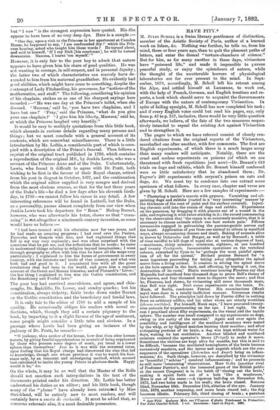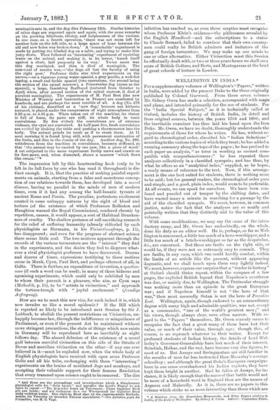HAVE PITY.*
M. JULES SCROLL is a Swiss literary gentleman of distinction, member of the Asiatic Society of Paris, author of a learned work on Islam, &c. Nothing was further, he tells us, from his mind, three or four years ago, than to quit the pleasant paths of letters, and enter the dismal "torture-chambers of science." But for him, as for many another in these days, vivisectors have "poisoned life," and made it impossible to pursue peaceful study, or enjoy the splendours of nature, while the thought of the unutterable horrors of physiological laboratories are for ever present to the mind. In Sept- ember, 1879, accordingly, M. Scholl left his retreat among the Alps, and settled himself at Lausanne, to work out, with the help of French, German, and English treatises and re- ports, a book which should serve to acquaint the Governments of Europe with the nature of contemporary Vivisection. In spite of failing eyesight, M. Scholl has now completed his task; and if every English voter could but read his pages, say, only from p.43 top. 157, inclusive, there would be very little question afterwards, we believe, of the fate of the two measures respec- tively intended to repeal the existing Act against Vivisection and to strengthen it.
The pages to which we have referred consist of closely ren- dered citations from the original reports of the Vivisectors, marshalled one after another, with few comments. The first are English experiments, of which there is a much larger array thin many readers will anticipate. Notably, there are the cruel and useless experiments on poisons (of which we are threatened with fresh repetitions just now)—Dr. Bennet's 619 trials on dogs and rabbits, which Dr. Bennet himself confessed were so little satisfactory that he abandoned them ; Dr. Fayrer's 280 experiments with serpent's poison on cats and dogs, &c. We must try to condense into one extract some specimen of what follows. In every case, chapter and verse are given by M. Scholl. Here are a few samples of experiments :—
"Plastering a terrier's muzzle with gypsum.. Varnishing and oil- painting dogs and rabbits (varied in a very interesting' manner by the thickness of the coat of paint and the surface covered). Inject- ing chromic acid into the crania of dogs and rabbits. Experiments on the pancreas, by dragging it with pincers out of a wound in the side, and replacing it with tubes sticking in it ; the record commencing by the observation that the organ is so extremely sensitive, that it is necessary to choose animals which can best sustain pain.' Fifteen tormentors engaged in galvanising the pnenmo-gastric nerves and the heart. Application of pus from one animal to others in manifold ways, always occasioning disease and death. Baking of animals alive in stoves by Delaroche and Berger, as well as by Bernard ; a table of time needful to kill dogs of equal size at various degrees of heat, —maximum, thirty minutes ; minimum, eighteen, at one hundred and twenty Centigrade. Innumerable operations on the vertebral column, remarked by Cyon to be perhaps the most painful opera- tion of all for the animal.' Bdclard praises Bernard for a most ingenious proceeding for taking away altogether the spinal nerve from a living animal. It consists in seizing the spinal nerve at the hole opened in the back, and effecting, by tearing it out, the destruction of its roots.' Malin mentions hearing Flourens say that Majendie had sacrificed four thousand dogs to prove Bell's theory of the nerves, and four thousand more to disprove the same; and that he, Flourens, had shewn, by vivisecting still some thousands more, that Bell was right. Next come experiments on the brain. Dr. Munk, of Berlin, condemns Ferrier. His examinations (Munk says) were done in a totally inefficient manner. Erroneous results have followed. The principles laid down by Ferrier differ in nothing from an arbitrary edifice, and his other views are utterly worthless (ebenso werthlos). For himself, Munk says, I have procured twenty- nine animals for experimenting on the ape. I lost eight. On the rest I practised about fifty experiments, on the visual and the tactile sphere. The number was small compared to my experiments on dogs, owing to the rarity of the material.' Again and over again the sensibility and intelligence of the mutilated monkeys were tested by the whip, or by lighted matches burning their muzzles ; and after extirpating portions of its brain, a dog was kept without water for days, waiting its last mutilation. Another blinded and mutilated creature resisted the operator's blows (Prilgel) to make it move. Sometimes the victims are kept alive for months, but this is said to be difficult, because the mutilated hemispheres of the brain become excessively sensitive, and the terror and anguish which are the con- sequences of the operations (Sehreeken und Angst) bring on inflam- mations,' Jrc. Such things, however, are described by the vivisector as beautiful [" schone ".] cerebral inflammations ;' and he proceeds to still more 'interesting' observations. Herr Goltz (another rival of Professor Ferrier's, and the honoured guest of the British public at the recent Congress) is in the habit of rinsing out the brain,' making it squirt forth out of a hole like a mushroom.' Here is one of his cases :—A vigorous bull-dog on November 8th, 1875, had two holes made in his scull ; the brain rinsed. Became blind, November 10th. December 11th, ablation of the eye. January 10th, 1876, another trepaning, and more brain rinsed out ; the dog becomes idiotic. February 5th, third rinsing of brain ; a purulent • Ayes Pitii. Qualques Mots sur PIIrgenea d'dbolir Totalmeat la floiatotion. Par Jules Charles SeholL 1 vol. Lausanne: Imer at Payot. 1831. meningitis sets in, and the dog dies February 15th. Similar histories of other dogs are repeated again and again, with the same remarks on the growing blindness, idiotcy, and helplessness of the victims. In one case, on a fourth operation, 'there was not room left for another hole on the left side, so a large space of bone between the old and new holes was broken down.' A 'remarkable' experiment is made by putting the blinded dog on a table, and trying to make him jump down. Then followed an 'interesting' experiment of squirting water on the animal, and making it, in its terror, knock itself against a chair, laid purposely in its way.' Twice more was this dog mutilated, and then it died of meningitis. The sum-total of results was,—' the dogs all lost the faculty of using the right paw.' Professor Goltz also tried experiments on the nerves,—on a vigorous young water-spaniel, a grey poodle, a well-fed lapdog, a small and feeble spaniel (two operations, the second being the section of the spinal marrow), a Pomeranian dog (same as the spaniel), a large, famishing Dorfhund (tortured from October to April, when, after second section of the spinal marrow, it died of purulent meningitis). The experiments of M. Paul Bert (the new Minister of Worship and Instruction in France) are numbered by hundreds, and are perhaps the most terrible of all. A dog (No. 278 of his vietims), described as a 'new dog,' because not hitherto tortured, is placed under the compression of eight atmospheres from 3.56 p.m. to 4.45 p.m. When taken out of the machine, its throat is fall of foam, its paws are stiff, its whole body in tonic convulsions. By five o'clock the convulsions are of extreme violence, the eyes are convulsed. At half-past five, fresh convulsions are excited by shaking the table and pushing a thermometer into the body. The animal grinds its teeth as if to crush them. At 11 next morning it is found lying still, with permanent contraction of the limbs, and dies in the course of the day. Another dog, No. 286, withdrawn from the machine in convulsions, becomes stiffened, so that 'the animal may be carried by one paw, like a piece of wood.' A cat subjected to the same experiment feebly mews and crawls on its fore-paws, and, when dissected, shows a marrow 'which flows like cream.' "*
The impression left by this heartrending book (only to be felt in its full force by one who has read it throughout) is dis- tinct enough. It is, that the practice of making painful experi-
ments on animals, starting from a false and monstrous concep- tion of our relations towards them, has developed into a moral disease, having no parallel in the minds of men of modern times, even if it had any among the half-lunatic tyrants of ancient Rome and Persia. The peculiar, portentous excitement
created in some unhappy natures by the sight of blood and torture (of the existence of which Professors Rolleston and Haughton warned the Royal Commission), rendered chronic by repetition, causes, it would appear, a sort of Habitual Drunken- ness of cruelty. The shallow pretence of self-sacrificing research for the relief of suffering humanity (already ridiculed by such physiologists as Hermann, in his Yivisectionsfrage, p. 15), has disappeared ; and even for the progress of abstract science there seems little zeal. The two motives apparent through the records of the various tormentors are the " interest " they find
in the experiments, and the desire they feel to disprove what- ever a rival physiologist professes to have discovered. Dozens and dozens of times, expressions testifying to these motives occur in Munk, Cyon, Paul Bert, and perhaps oftenest of all, in Goltz. There is further, an expenditure of invention, a sportive- ness (if such a word can be used), in many of these hideous and agonising experiments, which could only be exhibited by men to whom their pursuit is a pleasure, who aim, as Cyon says (Afethodik, p. 15), to be "artists in vivisection," and approach the torture-trough with " joyful excitement" (freudige Aufreguag).
How are we to meet this new vice, for such indeed it is, which now invades us like a moral epidemic ? If the Bill which is reported as likely to be introduced next Session by Sir J. Lubbock, to abolish the present restrictions on Vivisection, un- happily becomes law, through the indifference or misguidance of Parliament, or even if the present Act be maintained without more stringent precautions, the state of things which now exists in Germany will be reproduced here as inevitably as night follows day. The absurd delusion of the existence of a moral gulf between merciful vivisection on this side of the Straits of Dover and merciless vivisection on the other—if any one ever believed in it—must be exploded now, when the whole body of English physiologists have received with open arms Professor Goltz and, all his tribe, exchanging with them " interesting " experiments on the brains of mutilated dogs and monkeys, and accepting their valuable support for their famous Resolution that every trammel upon science ought to be removed. The dire
• And these are the proceedinas and investigations which a blasphemous physiologist calls his "daily bread," and parodies the Lord's Prayer to ask leave to repeat Die Angreifer beten im Vatertumer Unser tigliohes Brod gib Tins hente; mini wir verlautten days der Wissenschaft ihr titgliches Brod nicht verktirst words. Dies tiglivhe Brod aber jet die esperimentalle Methode, welche die Verenche an lebenden Thieren einschliesst."—Die Agitation gegen die vioiantion, von M. O. Vogt. infection has reached us, as even those sceptics must recognise whom Professor Klein's evidence—the pitilessness revealed by the English Handbook—and the subscriptions to a statue to Claude Bernard, failed to convince that their own country- men could really be British admirers and imitators of the gang of foreign tormentors. We may make up our minds to one or other alternative. Either Vivisection must this Session be effectually dealt with, or two or three years hence we shall see a score of British Goltzes, and Berts, and Mantegazzas at the head of great schools of torture in London.















































 Previous page
Previous page